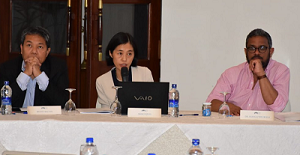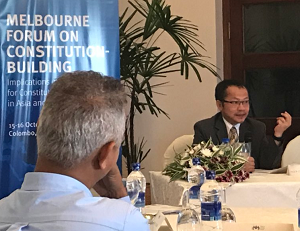Implications of constitutional culture for constitution‐making
The third theme of the Forum focused on constitutional culture and its impact on the processes and substance of constitution making.

Mr Asanga Weilikala (Sri Lanka)
Choices about the processes for constitution making and (legitimate) mechanisms for approving and promulgating a new constitution differ across the world, in part because of the different values and traditions of constitutional systems.
Particular substantive choices may be affected as well, by considerations that can be described as cultural in character. Examples include an aversion to divided sovereignty; a particular understanding of secularism; or a preference for constitutional control by a specialist Constitutional Court rather than a general apex court.

Constitutional culture can be disaggregated into the same four components described earlier in relation to culture more generally. Thus, constitutional culture encompasses beliefs and fundamental values (eg unity, liberty, solidarity, harmony); inherited traditions (eg a particular understanding of constituent power or the manner in which a new constitution achieves legitimacy); material factors (eg population size, poverty, inequality, difficulties of communication); and emotional concerns (eg a fear of secession).
As with any other understanding of culture, constitutional culture may be internally contested and is subject to change. Developing or adapting constitutional culture becomes particularly important for the implementation and maintenance of significant constitutional change, such as a transition from authoritarian to more democratic and pluralist regimes; from a unitary to a more devolved system of government; movement between presidential and forms of parliamentary systems; from a religious to a secular state, or vice versa; or from winner‐take‐all government to more consociational arrangements.

There were three case studies for this theme, from Japan, the Philippines and Myanmar. The case studies explored the following questions :
- How did constitutional culture affect the processes chosen for constitution building? How were those choices made?
- How did constitutional culture affect choices about the substantive changes to be made?
- Where constitutional culture had implications for constitution building, what are the sources of origins of this culture? Was it simply assumed? Was it contested?
- What advantages or disadvantages followed from accommodating or not accommodating existing constitutional culture? What lessons might be learnt from these experiences by other states, embarking on a constitution building project?
Case studies:
- Japan: Akiko Ejima
- Philippines: Benny Bacani
- Myanmar: Ngun Cung Andrew Lian